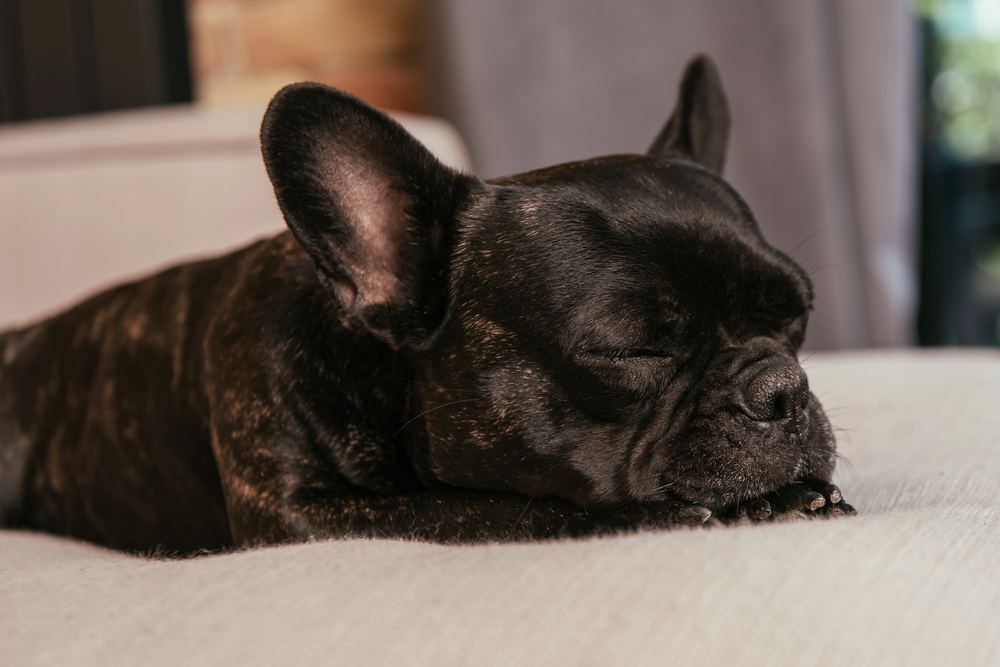I’m the first to say that Zed is full of piss and vinegar (more piss than vinegar). But the one time he’s not peeing is when he sleeps. But when a dog pees in his sleep, it could be pointing to a serious problem.
Canine incontinence occurs when a dog loses control of their bladder unintentionally. This condition typically manifests while your dog is asleep or at rest when the sphincter muscle relaxes, allowing urine to escape from the bladder.
Multiple factors can contribute to dog incontinence, and while it may not be preventable initially, various effective treatment options exist to help manage this condition.
How to tell if your dog has urinary incontinence
The main symptom of urinary incontinence in dogs is involuntary urine leakage. You may notice wet spots where your dog has been sleeping or sitting. The skin around your dog’s genital area might become irritated or red due to constant moisture, and your pet might increase genital licking behavior in response to the discomfort.
When monitoring this condition, pay close attention to the frequency, volume, and location of accidents. Female dogs tend to experience incontinence more frequently than males due to decreased estrogen levels, which can weaken urethral muscles. This hormone-related incontinence typically affects middle-aged to older spayed females.
Blood in your dog’s urine requires immediate veterinary attention as it could indicate a serious underlying condition. Prompt diagnosis and treatment of urinary issues are essential, as untreated incontinence can lead to secondary complications like bladder infections or kidney problems. Contact your veterinarian as soon as you notice any urinary abnormalities in your pet.
Related: Why does my fluffing dog pee on my bed?
Why does dog incontinence happen during the night?
During sleep, a dog’s muscles relax completely, including the urethral muscle that normally controls urine flow. This relaxation can lead to episodes of nighttime incontinence, often seen as small damp spots on your dog’s bedding. Though the amount of urine may be minimal, female dogs especially might release just a few drops during sleep.
These seemingly minor leaks are still cause for concern, as they can make your dog susceptible to urinary tract infections. The primary sign of nighttime incontinence is typically finding wet patches where your dog sleeps, indicating that they’re experiencing bladder control issues while unconscious.
Why is my dog peeing in his sleep?
There are several possible reasons why a dog may pee in their sleep, including:
Urinary Tract Infection (UTI): A UTI can cause inflammation and irritation in the bladder, leading to involuntary urination.
Bladder Stones: Stones in the bladder can cause pain and discomfort, which may stimulate urination.
Urinary Incontinence: This condition occurs when the bladder muscles are weakened or damaged, making it difficult to control urination.
Neurological Disorders: Certain neurological disorders, such as spinal cord injuries or brain tumors, can affect the nerves that control bladder function.
Chronic Kidney Disease: This condition can impair the kidneys’ ability to filter urine, leading to increased urination.
Hormonal Imbalances: In some cases, hormonal imbalances, such as in spayed or neutered dogs, can contribute to urinary incontinence.
Anxiety or Stress: Emotional distress can sometimes cause involuntary urination in dogs.
Age: Older dogs are more prone to urinary incontinence due to age-related muscle weakness.
Other Factors: Other factors that may contribute to a dog peeing in their sleep include obesity, poor housetraining, or a lack of access to outdoor areas to relieve themselves.
Diagnosis and treatment
If your dog is peeing in their sleep, it’s important to consult a veterinarian to determine the underlying cause. They may perform a physical exam, take a urine sample, or order additional tests such as an X-ray or ultrasound.
Treatment will depend on the specific cause. For example, UTIs may be treated with antibiotics, while urinary incontinence may require medication or surgery.
What not to do after your dog pees in his sleep
If your dog is experiencing nighttime urination, it’s essential to recognize this as a potential health signal rather than misbehavior. This symptom indicates your pet may need medical attention, not scolding or discipline.
Dog health issues can develop quickly and cause distress for both your pet and you as their caregiver. Regular observation of your pet’s habits allows for early detection and prompt treatment of emerging conditions.
When your dog urinates during sleep, they’re communicating a possible underlying problem that requires your attention. As responsible pet owners, we must respond by seeking appropriate veterinary care for our four-legged family members.
Remember that professional veterinary consultation is always the best course of action when addressing any concerning pet health issues.

